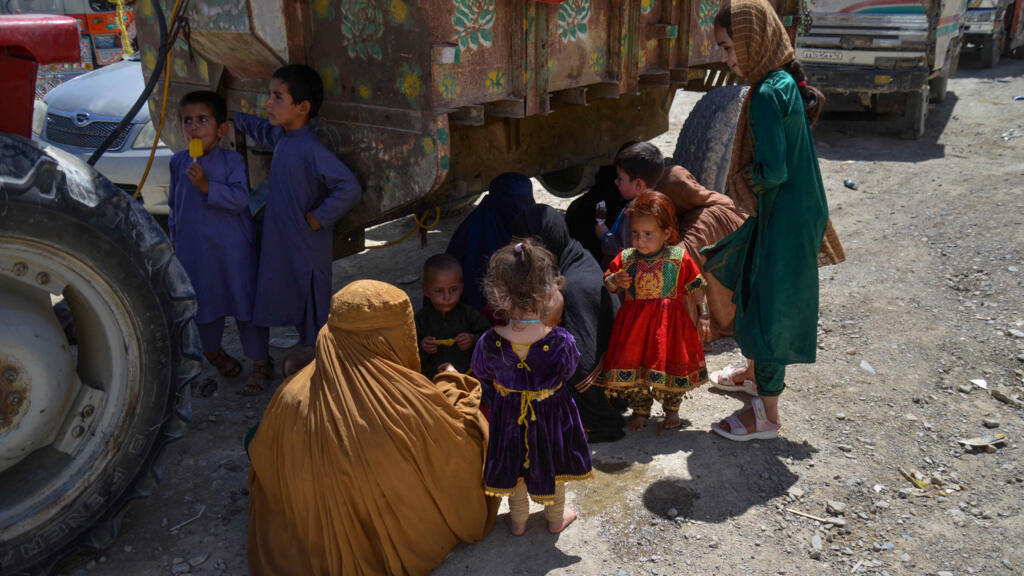
As Taliban forces hit back at Islamabad over alleged air raids inside Afghan territory, waves of refugees returning from Pakistan are struggling to rebuild their lives in Taliban-run Afghanistan.
On 11 October, Taliban forces launched armed “reprisals” against Pakistani troops, accusing Islamabad of carrying out airstrikes inside Afghan territory.
Amid this climate of hostility, convoys of Afghan families continue to stream back across the border – many of them expelled from Pakistan, others from Iran – in a surge of forced returns that is raising alarm among aid workers and humanitarian agencies.
Their arrival at Spin Boldak, in Afghanistan’s southern Kandahar province, takes place under chaotic conditions and these new arrivals often come without resources, back to a country they no longer know – or did not know at all – which is in the throes of a serious economic crisis.
The situation for women is the most critical, due to the restrictions imposed on them in Afghanistan: the need for a male family member to accompany them when they travel, the ban on attending school after the age of 12, and the difficulties they face in working independently.
Charity slams EU for 'staggering neglect' of Afghan refugees
'I know nothing about this country'
Inside a waiting room reserved for women, Rabia sits between her two daughters, Habiba and Assia.
Speaking to RFI, she explained that her family had lived in Pakistan for 40 years. “We have relatives here, but no home, no money."
“We are very worried. My husband is still over there. We don’t know anything about this country, we cannot read or write. We need help – we haven’t eaten for two days.”
Her husband is expected to follow later, bringing the family’s luggage.
Around an hour’s drive away, at the Anzargi transit camp, hundreds of returnees crowd into small rooms or wait in corridors for food and shelter.
Among them is 45-year-old Gul Ghoti, who fled Pakistan with her 10 children. Her eldest, an 11-year-old girl, had been attending school.
"In Pakistan, she was in Year 11. But here, I have no idea what we're going to do, I can't imagine. I know nothing about this country," she told RFI.
Once they leave these centres, women will have to conform to Taliban-imposed dress codes and movement restrictions, enforced by the Ministry for the Propagation of Virtue and the Prevention of Vice. Most of them are unaware of this.
‘All they dream of is leaving’: the reality of life for women under the Taliban
Decades in exile
At the Spin Boldak crossing alone, some 20,000 people arrived in just a few days, according to local officials.
Among them was 75-year-old Rahmatullah, who has spent decades in exile. Speaking to RFI, he recalled his ordeal.
“I’m from Jawzjan province, in northern Afghanistan. I’d lived in Baluchistan, Pakistan, for 45 years. One morning, while I was praying at the mosque, the police arrested me. I tried to tell them I had a refugee card, but they said it didn’t matter. They kept me in a place like a prison all day, and that night I was driven here.”
Rahmatullah did not get the chance to say goodbye to his family. “My wife, my children – they’re all still in Pakistan,” he says. “I have no money, nothing at all. I need help. I don’t know what to do.”
Taliban celebrate US departure, promise tolerance and reconciliation
Limited aid
Taliban officials at Zero Point, the Spin Boldak border post, insist they are trying to help.
“Pakistan has been expelling Afghan refugees for years,” says Ali Mohammad Haqmal, one of the commanders on site. “When people arrive here, we try to give them some cash, talk to them, reassure them. We tell them they are our brothers.”
But humanitarian workers say this assistance is nowhere near enough.
“Most arrivals are malnourished,” Mohamed Sabir, a doctor with the Red Crescent, told RFI. “We only have a few basic medicines. There’s not much we can give them.”
After registering, many families are bussed to temporary camps before being dispersed across the country.
Since January, nearly 1.8 million Afghans have returned from Iran and Pakistan. Afghanistan, still reeling from years of war, drought and sanctions, is struggling to absorb such numbers.
Economic opportunities are scarce, and international aid has dwindled since the Taliban’s return to power in 2021.
As winter approaches, the prospects for these returnees – particularly women and children – look increasingly bleak.
Adapted from this report and this report by RFI's special correspondent Margot Davier in Spin Boldak, Afghanistan.







